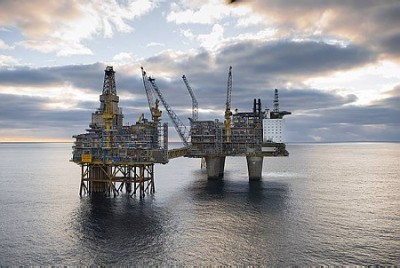NEWS ANALYSIS: The strongest warnings ever about the hazards of climate change, issued over the weekend, have prompted Norway’s new environment minister to promise that emissions cuts will be made in all sectors, including the country’s important oil industry. Others are urging a halt to all oil and gas exploration on the Norwegian continental shelf, and calling on political and business leaders to let oil and gas already found lie in the ground, to wean the country away from its climate-damaging activity.

“The government will bring down all emissions in Norway, from industry, from energy production, from transport and from construction,” Norway’s minister for the environment, Tine Sundtoft, said after the UN’s special panel on climate change released its latest alarming report on Sunday.
Norway’s huge oil and gas industry literally fuels the country’s economy, though, and earlier lofty promises by Norwegian politicians to cut emissions haven’t been met. The former left-center coalition government, made up of three allegedly environmentally friendly parties, failed to build its much-hyped carbon capture plant at Statoil’s Mongstad refinery, pushed forward with opening new areas of the Arctic to more offshore oil and gas exploration, and nearly approved drilling off scenic Lofoten and Vesterålen. Despite political rhetoric about the need for emissions cuts, not least from former Labour Prime Minister Jens Stoltenberg, the jobs that the oil and gas industry generates seemed most important to the Labour-led coalition. Former Oil & Energy Minister Ola Borten Moe from the Center Party, meanwhile, was bullish on opening new oil and gas fields despite his party fellows’ tendency to deck themselves out in green. His bullishness contributed to the deep split within his party.

It now seems left to the new conservative government to crack down on carbon emissions if Norway should have any hope of meeting its climate goals. Sundtoft, from the Conservative Party herself, seems an even less likely champion of emissions cuts than her predecessors in the former left-center government, but she delivered some surprisingly tough messages on Sunday.
“The report from the UN’s climate panel shows that we also, in Norway, must cut emissions,” she told Norwegian Broadcasting (NRK). “We must cut within oil and gas.” She also quickly referred to many other means of reducing emissions, but she was clear that the oil industry must cut as well, and is under pressure to do so by the UN climate panel itself, not just environmentalists.
Emissions high in Norway
It’s the oil and gas industry that makes Norway’s emissions so high on a per capita basis. Given Norway’s relatively small population of around 5 million people, all the individual efforts to cut emissions (from driving electric cars to cutting down on airline travel) combined won’t have as great an effect as some serious cuts in the energy sector would. Demands for Statoil to fully electrify new oil and gas fields or go along with the carbon capture project at its Mongstad refinery have met strong resistance, though, because of their cost, while the company also refuses to pull out of its controversial oil/tar sands project in Canada or stop exploring for new oil and gas off Norway.
It’s only natural for the oil companies and offshore firms that sell to them to want to preserve their core business activities. The pressure is now on, however for them to reduce some of that activity. “We’re pumping the world full of carbon dioxide through our oil and gas exports,” claimed Lars Haltbrekken, leader of Norway’s chapter of Friends of the Earth (Naturvernforbund). “We are responsible for a large portion of the emissions that are slipping out.”
With the new UN panel’s report showing “dramatic development” of emissions, Haltbrekken proposed that “as much as 85 percent of the (oil and gas) reserves we have found must be left to lie in the ground. It’s not enough to just cut consumption of coal, we also have to cut our consumption of oil and gas in half.”
‘Special responsibility’
As an oil and gas nation, he believes Norway has a “special responsibility” to reduce oil production and emissions. “It’s meaningsless to keep looking for more oil and gas,” Haltbrekken told newspaper Dagsavisen on Monday. “Norway should take responsibility and cancel exploration operations.” The Socialist Left party has suggested the same, even though it didn’t succeed in reducing exploration after eight years in government.
Sundtoft wouldn’t directly address proposals to halt exploration, seen as unrealistic in many circles, but repeated vows of energy production cuts throughout the day. She also pointed to other many other measures such as more funding for railroad projects to get more cars and trucks off the road. Norway has long emphasized public transportation over private car use and already ranks as having a high percentage of electric cars. New construction projects should be built close to public transport hubs, she said, and buildings must be more environmentally friendly. Pressure is on to also invest in more renewable energy projects, not least through Norway’s huge sovereign wealth fund.
Calls have also gone out for obligatory annual reports to the Parliament on the progress of emissions cuts, implementation of climate measures and the effects of them. The Socialist Left party proposed the so-called annual “climate budgets” and is gaining support from Labour, the Liberals and the Christian Democrats. Sundtoft also appeared open to the idea, as a means of holding the government accountable.
newsinenglish.no/Nina Berglund

